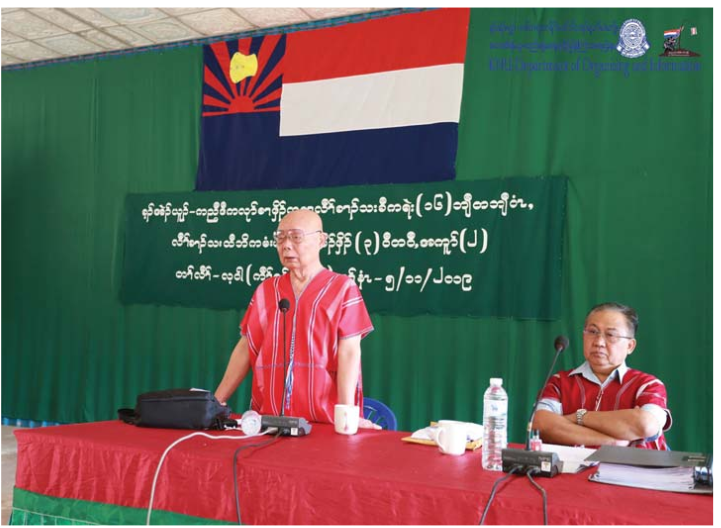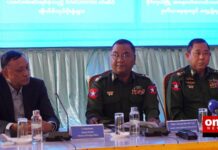On 26 December 2019 Karen New Year Day, Karen National Union (KNU) Chairman Saw Mutu Say Poe in his felicitation letter to all Karen nationals conveyed the message that they be blessed with dignity, peace, prosperity and peace of mind. Accordingly, the Karen era calendar is 2759.

The letter urged the Karen to maintain their collective cultural characteristic and national identity, adding that the constitution of the country must guarantee the rights of nationality to exercise its legal cultural rights and must provide support for the implementation.
But the said rights are still not yet achieved and the KNU, mandated by the Karen people, has been in armed resistance for over 70 years, said the felicitation letter.
Most importantly, the core message said: “Currently, the KNU and some ethnic armed organizations have entered into a ceasefire agreement and held talks with the government to get those rights by finding a solution politically. Ceasefire alone does not mean that peace is achieved.”
“Genuine peace will be achieved only when every nationality, including the Karen people, inhabiting our Union is respected and recognized as a nationality, given the rights of freedom, equality and self-determination,” said the letter.
The Karen New Year message of the KNU Chairman received endorsement from wide range of Karen political parties and as well the civil society organizations.
The General Secretary of Karen National Party Mahn Kyaw Nyein, the Chairman of Karen National Democratic Party Mahn Aung Pyi Soe, and spokesperson of the Karen civil society Nan Myint Aung all heartily endorsed the KNU Chairman Mutu Say Poe’s new year message.
The House of Nationalities or the upper house MP and Karen National Unity and Peace Committee member Naw Susanna Hla Hla Soe said that in order to achieve the ethnic nationalities’ aspirations of equality and rights of self-determination, the 2008 military-drafted constitution has to be amended.
State Counselor Daw Aung San Suu Kyi also sent message of greetings saying: “At this auspicious time of the Kayin New Year, which is the harvest time of the new crop, as families celebrate the new harvest happily, I hope that you will be able to celebrate the auspicious Kayin (Karen) New Year happily.”
She additionally said: “Just like other citizens, Kayin ethnic nationals have seen and understood, based on their life experiences, the need to attain long lasting and stable peace for national development; this is because Myanmar has suffered heavily the ravages of internal armed conflicts for many decades.”
She praised the Karen people acknowledging: “As we walk on the path towards a Democratic Federal Union, which is the goal of national reconciliation and union peace, we are walking hand in hand with fellow builders of the Union in weal and woe. It is heartening to note that Kayin nationals have been working with the Union Government, meeting all difficulties and challenges by sharing views and having close consultations, looking ahead to a future after the 2020 elections, implementing step by step with pragmatic methods, to create a stable path.”
Meanwhile, the Myanmar military (Tatmadaw) and KNU held a commander level meeting in Kyaukkyi, Bago Region on December 27, 2019 for the first time in over four years since the ethnic armed groups (EAOs) signed the nationwide ceasefire agreement (NCA). It was the followup of Tatmadaw negotiation team and KNU delegation meeting in Naypyitaw on December 10.

The meeting discussed on how to consolidate ceasefire which stems from Tatmadaw road-building in KNU territories where Brigade 3 and 5 are based. Reportedly, small skirmishes numbering some 100 occurred between the KNU and Tatmadaw all through out the year, due to the disagreement over road-building. The discussion is said to continue in January, according to both parties.
While the KNU and Tatmadaw downplay and rarely publicize the armed skirmishes, the KNU withdrawal officially seems mainly to be because of this Tatmadaw’s road-building row.
On December 22, the 10 NCA-signatory EAOs and government’s National Reconciliation Peace Center (NRPC) representatives met in Yangon and agreed to hold Joint Implementation Coordination Meeting (JICM) on January 8, 2020.
Reportedly, JICM the highest organ of the NCA-based peace negotiation process has agreed upon eight topics, which include: to hold Union Peace Conference – 21st Century Panglong; to convene JICM; to hold political discussion and consolidation of ceasefire; to hold Joint Ceasefire Monitoring Committee meetings in order to talk about military matters; to discuss different interpretation of the NCA by the parties involved; and to draw up peace negotiation agendas for the post-2020 elections.
Taken into account of the recent political development, such as the Tatmadaw and KNU meeting to resolve the road-building row, proposed talks to bridge the difference of NCA interpretation, deliberation to hold regular JICM, all indicated that a slow official restarting of the peace process may be in the making.
But on the other hand, the armed conflict with the Tatmadaw in Kachin, northern Shan and Arakan states are an ongoing mixture of mild, less serious to serious clashes. The Kachin area could be taken as mild with few skirmishes during the year, northern Shan State as serious, while the Arakan State is the most fierce and serious one. The Karen State would also come under the category of less serious, in comparison to the northern Shan and Arakan states.
As such, the a slow reopening of the NCA-based peace process may be an opportunity, but failure to stop the armed conflict in Kachin, Shan, and Arakan states will block the way for bilateral ceasefire with the Northern Alliance – Burma (NA-B). This, in turn, will hinder all-inclusiveness participation of the EAOs and thereby hindering the comprehensive, all-embracing solution of the conflict.
NA-B is made up of Arakan Army, Kachin Independence Army, Kokang or Myanmar National Democratic Alliance Army, Ta’ang National Liberation Army, which is a military alliance. And it is politically link to a seven-member alliance of Federal Political Negotiation Consultative Committee, which also includes the Shan State Progress Party, United Wa State Army, and Mongla or National Democratic Alliance Army.
In sum, given such unfavorable political development on the ground, the KNU Chairman’s wishes and demands made known on the Karen New Year will still have to wait for some more times for realization, if not much, much longer.












Leave a Comments